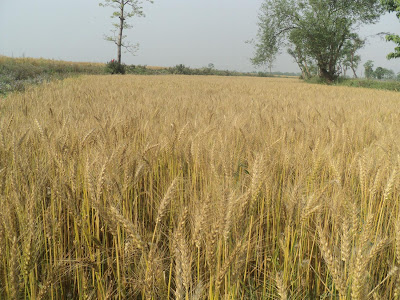Under the fading light of solar lamp, Chepang jhankri (shaman) was beating the dhyangro (drum) and uttering mantra.
Sitting by the side of the fire and being surrounded by family members and
onlookers, jhankri first muttered few
words with slow beat of drum that gained the momentum gradually culminating in
violent shaking of his body and again slowing down the pace.
Rhythmic sound of drum and the small bells, attached
at the circular rim of drum, was so resounding that people from afar knew that jhankri was flexing his muscles against
the evil spirits to drive them away from the house. Family offered him rice
grains and money on the plate. He put the string of beads upon the plate. The
family members were busy preparing the essentials: pieces of stone, wooden pegs
and thread needed for the rituals.
Saturday, April 13, 2013
Friday, March 29, 2013
Harvesting Wheat
Wheat
is ready for harvest but, sadly, field mice are the ones which harvested the
crop first. I had been delighted to see the good crop but thorough inspection
revealed the empty patches at the center of the field with numerous burrows
surrounded by stiff stubbles. I was obviously disappointed to notice hard grown
grains being looted by marauders.
After
the rice season, there were two options, wheat or mustard to grow in my land. I
preferred wheat for two reasons. Mustard had been marred by severe weather last
season. Accordingly many farmers, especially ones who grew mustard, suffered
heavy loss. Unlike wheat, mustard does not prefer much rain. The other reason
is scarcity of wheat, one of the ingredients to make satu (food for school
children supplied by Books for Nepal), last year. I thought of easy
accessibility of wheat to make satu when I grow it in my land.
Wednesday, March 6, 2013
Crossroads
Everything
is quiet. Leaves on trees are all motionless. We hear shuffling of the dead
leaves as we are walking on a narrow trail through the forest. The other faint sound
is a call of Collared Owlet from the distant. As the morning sunlight
penetrates the mist between trees, series of light and dark patterns are
shooting down like arrows. I am suffocating. Dark jumper on my shoulder not
much of a help to keep me warm from the cold. The fraying edge of black
coat-sleeves of Som Bahadur is moving like dragonfly. We are walking down-hill to
town to find the work to sustain our family.
Saturday, February 23, 2013
Peace Unearthed
As we were
descending down from the Kathmandu to Lumbini, the
birthplace of Buddha, trailing the cloud of mist through rolling hills along
the river valley and then plain of Terai, I was thinking of the spiritual
journey to calm my body and soul.
Last year
filled with trauma and turmoil. I was affected more by news of violence perpetuated
by humans upon humanity; atrocity on innocent children, especially, was
shocking. I was happy that the new year began with this promising journey for seeking
peace and equanimity.
Thursday, December 20, 2012
Witnessing Myself
Once I walked, from dawn
to dusk, to a school located in remote hill region of Chitwan, and back home in
town. As I walked briskly in the morning with energy and vigor, it took me
little less than 5 hours to get to the school. But upon returning, I spent more
than 6 hours walking under the sun that took a full toll on my body. I could
feel the pain under my feet. That pain gradually moved upward in ultra slow
motion from feet to ankle, to leg, and to the knees. I could clearly feel the
pain ascending up as if I was a witness to what is happening to my body. I
realized that sense of pain is one thing because it is certainly painful,
whilst witnessing the pain is completely a different thing, an awakening
experience. The witnessing the pain made fun of my misery. I was saying to
myself, “See, what pain is? You could have stayed in the village and come back
tomorrow. Now you well deserve this suffering.” Well, I was determined on my
mission and I knew exactly what I needed to do, for my mind is active and aware
of the situation.
Saturday, October 27, 2012
Friday, June 15, 2012
Maize Amazed
Traditional
agriculture in Nepal largely depends on rain, especially in hill region where
there is no irrigation facilities. This year, there is not much pre-monsoon
rain that has severe impact on crops mainly maize.
This long drought and scorching heat make new shoots of maize get dried and they are at the verge of complete destruction if there is no rain sooner.
This long drought and scorching heat make new shoots of maize get dried and they are at the verge of complete destruction if there is no rain sooner.
Subscribe to:
Posts (Atom)




